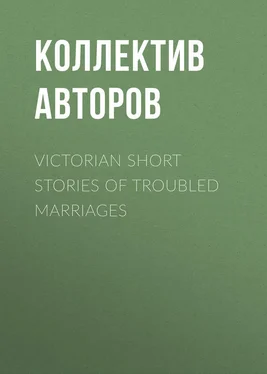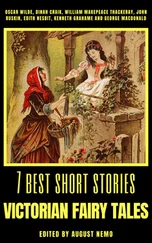Коллектив авторов - Victorian Short Stories of Troubled Marriages
Здесь есть возможность читать онлайн «Коллектив авторов - Victorian Short Stories of Troubled Marriages» — ознакомительный отрывок электронной книги совершенно бесплатно, а после прочтения отрывка купить полную версию. В некоторых случаях можно слушать аудио, скачать через торрент в формате fb2 и присутствует краткое содержание. Жанр: foreign_antique, foreign_prose, на английском языке. Описание произведения, (предисловие) а так же отзывы посетителей доступны на портале библиотеки ЛибКат.
- Название:Victorian Short Stories of Troubled Marriages
- Автор:
- Жанр:
- Год:неизвестен
- ISBN:нет данных
- Рейтинг книги:4 / 5. Голосов: 1
-
Избранное:Добавить в избранное
- Отзывы:
-
Ваша оценка:
- 80
- 1
- 2
- 3
- 4
- 5
Victorian Short Stories of Troubled Marriages: краткое содержание, описание и аннотация
Предлагаем к чтению аннотацию, описание, краткое содержание или предисловие (зависит от того, что написал сам автор книги «Victorian Short Stories of Troubled Marriages»). Если вы не нашли необходимую информацию о книге — напишите в комментариях, мы постараемся отыскать её.
Victorian Short Stories of Troubled Marriages — читать онлайн ознакомительный отрывок
Ниже представлен текст книги, разбитый по страницам. Система сохранения места последней прочитанной страницы, позволяет с удобством читать онлайн бесплатно книгу «Victorian Short Stories of Troubled Marriages», без необходимости каждый раз заново искать на чём Вы остановились. Поставьте закладку, и сможете в любой момент перейти на страницу, на которой закончили чтение.
Интервал:
Закладка:
Victorian Short Stories of Troubled Marriages
THE BRONCKHORST DIVORCE-CASE
By Rudyard Kiplin
In the daytime, when she moved about me,
In the night, when she was sleeping at my side, —
I was wearied, I was wearied of her presence,
Day by day and night by night I grew to hate her —
Would God that she or I had died!
– CONFESSIONSThere was a man called Bronckhorst – a three-cornered, middle-aged man in the Army – grey as a badger, and, some people said, with a touch of country-blood in him. That, however, cannot be proved. Mrs. Bronckhorst was not exactly young, though fifteen years younger than her husband. She was a large, pale, quiet woman, with heavy eyelids over weak eyes, and hair that turned red or yellow as the lights fell on it.
Bronckhorst was not nice in any way. He had no respect for the pretty public and private lies that make life a little less nasty than it is. His manner towards his wife was coarse. There are many things – including actual assault with the clenched fist – that a wife will endure; but seldom a wife can bear – as Mrs. Bronckhorst bore – with a long course of brutal, hard chaff, making light of her weaknesses, her headaches, her small fits of gaiety, her dresses, her queer little attempts to make herself attractive to her husband when she knows that she is not what she has been, and – worst of all – the love that she spends on her children. That particular sort of heavy-handed jest was specially dear to Bronckhorst. I suppose that he had first slipped into it, meaning no harm, in the honeymoon, when folk find their ordinary stock of endearments run short, and so go to the other extreme to express their feelings. A similar impulse makes a man say, ' Hutt , you old beast!' when a favourite horse nuzzles his coat-front. Unluckily, when the reaction of marriage sets in, the form of speech remains, and, the tenderness having died out, hurts the wife more than she cares to say. But Mrs. Bronckhorst was devoted to her 'Teddy' as she called him. Perhaps that was why he objected to her. Perhaps – this is only a theory to account for his infamous behaviour later on – he gave way to the queer, savage feeling that sometimes takes by the throat a husband twenty years married, when he sees, across the table, the same, same face of his wedded wife, and knows that, as he has sat facing it, so must he continue to sit until the day of its death or his own. Most men and all women know the spasm. It only lasts for three breaths as a rule, must be a 'throw-back' to times when men and women were rather worse than they are now, and is too unpleasant to be discussed.
Dinner at the Bronckhorsts' was an infliction few men cared to undergo. Bronckhorst took a pleasure in saying things that made his wife wince. When their little boy came in at dessert Bronckhorst used to give him half a glass of wine, and, naturally enough, the poor little mite got first riotous, next miserable, and was removed screaming. Bronckhorst asked if that was the way Teddy usually behaved, and whether Mrs. Bronckhorst could not spare some of her time 'to teach the little beggar decency'. Mrs. Bronckhorst, who loved the boy more than her own life, tried not to cry – her spirit seemed to have been broken by her marriage. Lastly, Bronckhorst used to say, 'There! That'll do, that'll do. For God's sake try to behave like a rational woman. Go into the drawing-room.' Mrs. Bronckhorst would go, trying to carry it all off with a smile; and the guest of the evening would feel angry and uncomfortable.
After three years of this cheerful life – for Mrs. Bronckhorst had no women-friends to talk to – the station was startled by the news that Bronckhorst had instituted proceedings on the criminal count , against a man called Biel, who certainly had been rather attentive to Mrs. Bronckhorst whenever she had appeared in public. The utter want of reserve with which Bronckhorst treated his own dishonour helped us to know that the evidence against Biel would be entirely circumstantial and native. There were no letters; but Bronckhorst said openly that he would rack Heaven and Earth until he saw Biel superintending the manufacture of carpets in the Central Jail. Mrs. Bronckhorst kept entirely to her house, and let charitable folks say what they pleased. Opinions were divided. Some two-thirds of the station jumped at once to the conclusion that Biel was guilty; but a dozen men who knew and liked him held by him. Biel was furious and surprised. He denied the whole thing, and vowed that he would thrash Bronckhorst within an inch of his life. No jury, we knew, would convict a man on the criminal count on native evidence in a land where you can buy a murder-charge, including the corpse, all complete for fifty-four rupees; but Biel did not care to scrape through by the benefit of a doubt. He wanted the whole thing cleared; but, as he said one night, 'He can prove anything with servants' evidence, and I've only my bare word.' This was almost a month before the case came on; and beyond agreeing with Biel, we could do little. All that we could be sure of was that the native evidence would be bad enough to blast Biel's character for the rest of his service; for when a native begins perjury he perjures himself thoroughly. He does not boggle over details.
Some genius at the end of the table whereat the affair was being talked over, said, 'Look here! I don't believe lawyers are any good. Get a man to wire to Strickland, and beg him to come down and pull us through.'
Strickland was about a hundred and eighty miles up the line. He had not long been married to Miss Youghal, but he scented in the telegram a chance of return to the old detective work that his soul lusted after, and next time he came in and heard our story. He finished his pipe and said oracularly, 'We must get at the evidence. Oorya bearer, Mussulman khit and sweeper ayah , I suppose, are the pillars of the charge. I am on in this piece; but I'm afraid I'm getting rusty in my talk.'
He rose and went into Biel's bedroom, where his trunk had been put, and shut the door. An hour later, we heard him say, 'I hadn't the heart to part with my old make-ups when I married. Will this do?' There was a loathly fakir salaaming in the doorway.
'Now lend me fifty rupees,' said Strickland, 'and give me your Words of Honour that you won't tell my wife.'
He got all that he asked for, and left the house while the table drank his health. What he did only he himself knows. A fakir hung about Bronckhorst's compound for twelve days. Then a sweeper appeared, and when Biel heard of him , he said that Strickland was an angel full-fledged. Whether the sweeper made love to Janki, Mrs. Bronckhorst's ayah , is a question which concerns Strickland exclusively.
He came back at the end of three weeks, and said quietly, 'You spoke the truth, Biel. The whole business is put up from beginning to end. Jove! It almost astonishes me ! That Bronckhorst beast isn't fit to live.'
There was uproar and shouting, and Biel said, 'How are you going to prove it? You can't say that you've been trespassing on Bronckhorst's compound in disguise!'
'No,' said Strickland. 'Tell your lawyer-fool, whoever he is, to get up something strong about "inherent improbabilities" and "discrepancies of evidence". He won't have to speak, but it will make him happy, I 'm going to run this business.'
Biel held his tongue, and the other men waited to see what would happen. They trusted Strickland as men trust quiet men. When the case came off the Court was crowded. Strickland hung about in the veranda of the Court, till he met the Mohammedan khitmutgar . Then he murmured a fakir's blessing in his ear, and asked him how his second wife did. The man spun round, and, as he looked into the eyes of 'Estreekin Sahib', his jaw dropped. You must remember that before Strickland was married, he was, as I have told you already, a power among natives. Strickland whispered a rather coarse vernacular proverb to the effect that he was abreast of all that was going on, and went into the Court armed with a gut trainer's-whip.
Читать дальшеИнтервал:
Закладка:
Похожие книги на «Victorian Short Stories of Troubled Marriages»
Представляем Вашему вниманию похожие книги на «Victorian Short Stories of Troubled Marriages» списком для выбора. Мы отобрали схожую по названию и смыслу литературу в надежде предоставить читателям больше вариантов отыскать новые, интересные, ещё непрочитанные произведения.
Обсуждение, отзывы о книге «Victorian Short Stories of Troubled Marriages» и просто собственные мнения читателей. Оставьте ваши комментарии, напишите, что Вы думаете о произведении, его смысле или главных героях. Укажите что конкретно понравилось, а что нет, и почему Вы так считаете.

![Коллектив авторов - Best Short Stories [С англо-русским словарем]](/books/26635/kollektiv-avtorov-best-short-stories-s-anglo-thumb.webp)










